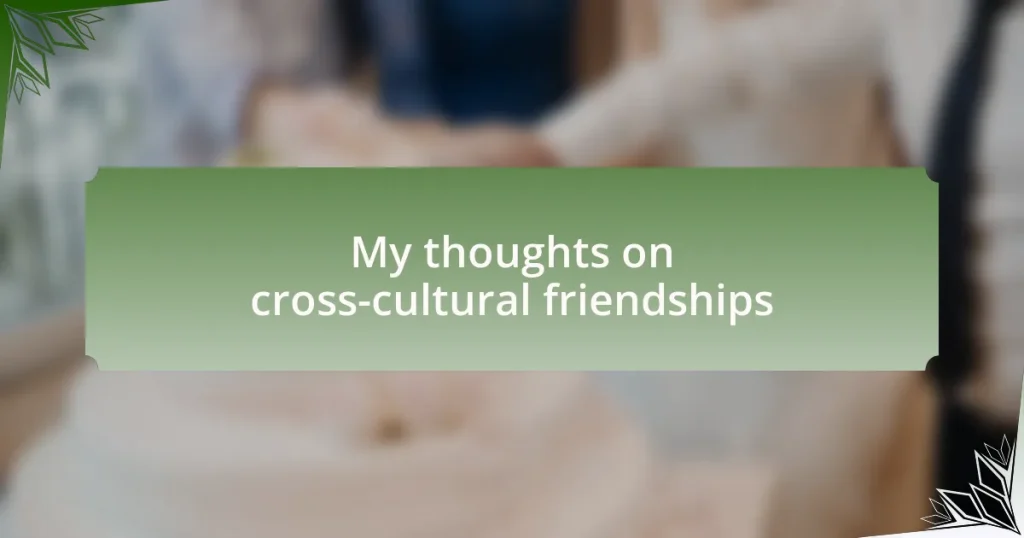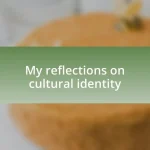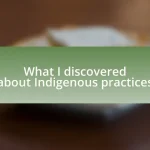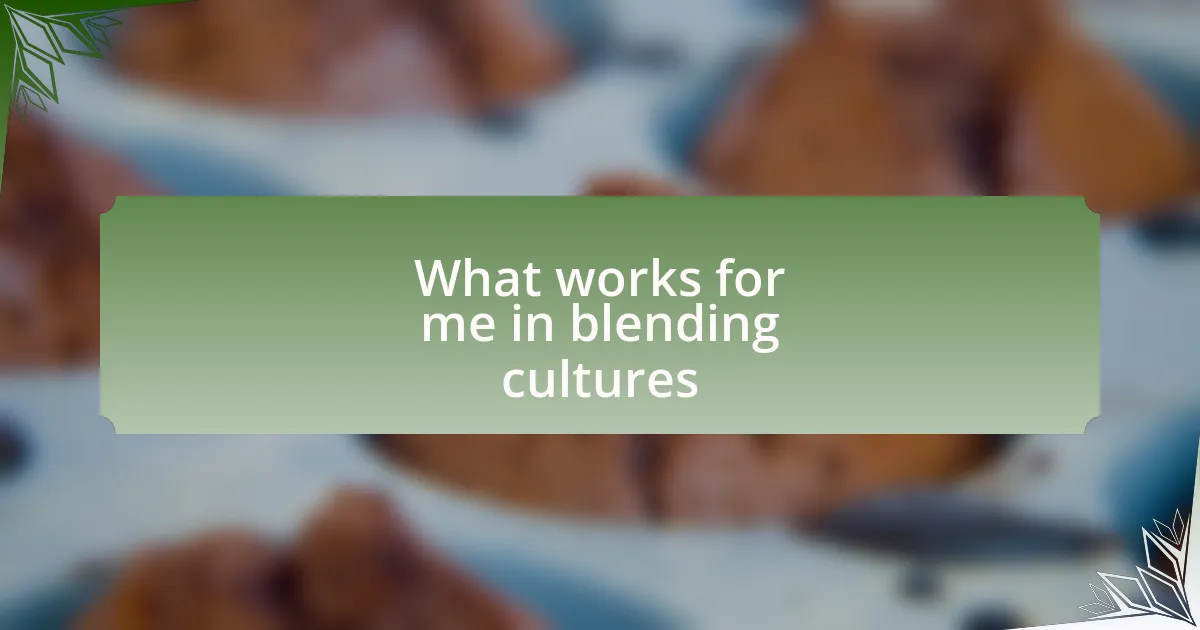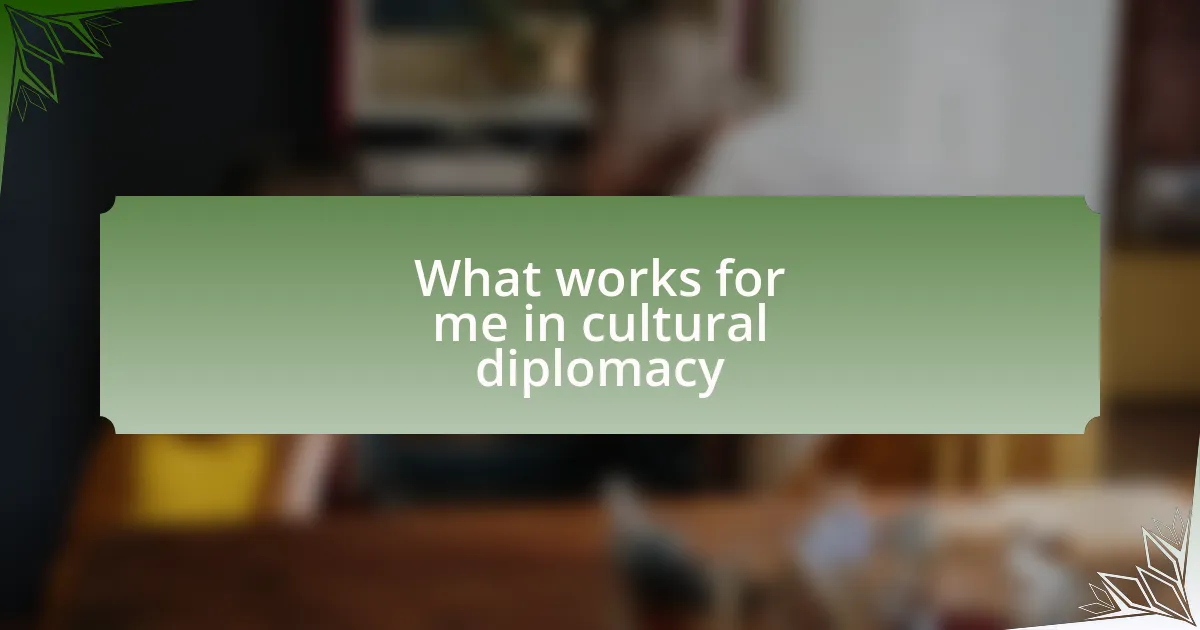Key takeaways:
- Cross-cultural friendships enrich understanding and foster personal growth through shared experiences and open communication.
- Friendships play a vital role in weddings, providing emotional support and enhancing the overall experience for couples and guests.
- Wedding cakes reflect cultural diversity, with distinct styles and flavors symbolizing the couple’s heritage and love story.
- Incorporating cultural elements in wedding cakes can enhance unity, with symbolic decorations and traditions that celebrate diverse backgrounds.
Author: Evelyn Carter
Bio: Evelyn Carter is an award-winning author known for her gripping psychological thrillers and captivating contemporary fiction. With a background in psychology, she skillfully weaves intricate character studies and suspenseful plots, engaging readers from the first page to the last. Her debut novel, “Shadows of the Mind,” was praised for its sharp insights and unexpected twists, earning her a place among the best new voices in literature. When she’s not writing, Evelyn enjoys exploring the great outdoors and volunteering at her local animal shelter. She lives in Portland, Oregon, with her two spirited rescue dogs.
Understanding cross-cultural friendships
Cross-cultural friendships can be a beautiful tapestry woven from different backgrounds, traditions, and perspectives. I remember a friend from India who introduced me to Diwali celebrations. It was incredible to experience the festival of lights through her eyes, deepening my appreciation for her culture. Isn’t it fascinating how sharing such moments can bring people closer and offer a deeper understanding of our differences?
Such friendships often require navigating cultural nuances, which can be challenging yet rewarding. There have been times when my assumptions clashed with my friend’s practices, leaving me puzzled. How do we bridge those gaps? I found that open communication is key—simply asking questions and showing genuine curiosity fosters trust and connection. It’s amazing how a willingness to learn can turn misconceptions into meaningful discussions.
Additionally, I’ve noticed that these friendships often challenge us to rethink our own beliefs and values. For instance, learning about my friend’s views on marriage prompted me to reflect on my own relationship. Have you ever found yourself gaining new insights about love and commitment from someone else’s perspective? It’s thought-provoking to consider how much we can grow when we embrace diverse viewpoints.
Importance of friendships in weddings
Friendships play a vital role in weddings, serving as a source of emotional support and joy. I recall my friend’s wedding, where her closest friends rallied together to help with the planning. It was heartwarming to witness how their bond transformed what could be a stressful process into an exciting adventure. Don’t you think that having friends by your side can make a significant difference on such a special day?
Moreover, the presence of friends at weddings often enhances the emotional experience for the couple. I remember standing by my best friend during her vows, feeling overwhelmed with happiness and pride. Those shared tears and laughter created lasting memories, reinforcing the importance of friendships during life’s milestones. Who else better to share those moments with than the people who know you best?
In many cultures, friends are included in wedding traditions, emphasizing their significance in the celebration. I’ve seen friends act as unofficial organizers, guiding guests in rituals and adding personal touches that reflect the couple’s journey together. This inclusion not only honors the friendships but also strengthens the community bonds that surround the couple as they embark on their new life together. Isn’t it beautiful how these connections can amplify the love and joy of a wedding?
Cultural influences on wedding cakes
Cultural influences play a significant role in shaping wedding cakes, reflecting diverse traditions and preferences around the world. For instance, I remember attending a traditional Indian wedding where the cake was adorned with intricate henna designs. It wasn’t just a dessert; it symbolized the couple’s rich heritage and the blend of culture and creativity. This made me ponder; how often do wedding cakes serve as a canvas for personal stories?
In Italy, you might encounter the beloved Crostata, showcasing a delightful mix of textures and flavors rather than the classic multi-tiered cake. The focus is on bringing people together to enjoy a sweet experience, a value deeply embedded in Italian culture. I recall the warmth of shared laughter around that tart, where each slice held a memory. Doesn’t it make you reflect on how food, especially at weddings, weaves cultural narratives?
When I think about the fusion of cake traditions from different cultures, I am reminded of a friend’s wedding where they combined elements from both Italian and traditional American weddings. The cake had layers of rich Italian ricotta and smooth American buttercream. This delicious compromise created an experience that resonated with guests from both sides. Isn’t it fascinating how cake can symbolize unity and celebrate diverse heritages at the same time?
Popular wedding cake styles globally
When exploring popular wedding cake styles globally, I’ve noticed that the classic English fruitcake stands out. It’s dense, rich, and often soaked in brandy, making it a symbol of celebration that lasts long after the wedding day. I remember attending a wedding where the couple saved the top tier to enjoy on their first anniversary. Isn’t it lovely to think how a cake can create lasting traditions and memories?
In contrast, the Japanese wedding cake, or “shiroi kekkai,” typically features an airy sponge layered with delicate flavors, resembling the simplicity and beauty of Japanese culture. I fondly recall seeing this style at a close friend’s wedding, where the cake was elegantly decorated with cherry blossoms. It made me wonder if the understated beauty of such cakes could inspire couples to choose elegance over extravagance.
Meanwhile, the Mexican three-milk cake, or “tres leches,” is a deliciously moist option often served at weddings. I had a slice once at a vibrant wedding celebration, and the sweetness truly reflected the joyous atmosphere. Isn’t it amazing how different cake styles not only tantalize the taste buds but also encapsulate cultural identity and personal stories?
Tips for incorporating cultural elements
Incorporating cultural elements into wedding cakes can be a beautiful way to honor diverse backgrounds. I remember a friend who blended her Italian heritage with her partner’s Caribbean roots by infusing the traditional panettone with tropical fruits like pineapple and coconut. Have you ever thought about how combining these distinct flavors can tell a couple’s unique love story on their wedding day?
Another tip is to use symbolic decorations that reflect both cultures, like fondant figurines or intricate patterns. At one wedding, I saw a cake adorned with motifs inspired by both Eastern and Western artistic styles. It was fascinating to see how the couple’s cake visually represented their journey together, merging their families’ traditions in one delicious centerpiece. Don’t you think that’s a meaningful way to express unity?
Finally, consider the ritual of cake cutting itself, which varies across cultures. For instance, a couple might incorporate a traditional Italian cake-cutting song or a South Asian ceremonial style into their celebration. I participated in a wedding where the cutting was accompanied by a traditional dance, creating a lively atmosphere that everyone cherished. How can you make your cake-cutting moment memorable by weaving in your own cultural threads?
Celebrating diversity through wedding cakes
Celebrating diversity through wedding cakes is truly a delightful experience. I recall attending a wedding where the couple chose to honor their heritages by using flavors typical of their cultures. The cake featured layers of red velvet and dulce de leche — a vibrant blend that not only satisfied the taste buds but also symbolized their love story. Isn’t it amazing how a cake can serve as a canvas for such a rich cultural tapestry?
The design of wedding cakes can also be a profound expression of unity. I once saw a cake that beautifully incorporated elements from both African and European traditions, showcasing intricate carvings and bright colors representative of both cultures. Each slice served not just as dessert, but as a celebration of two families coming together. Doesn’t that inspire you to think about how your own wedding cake could reflect your journey?
Moreover, the act of sharing cake often embodies a deeper cultural significance. In some cultures, it represents the couple’s commitment to nurture their relationship, while in others, it’s intertwined with ancient rituals. I remember attending a wedding where, instead of the typical cake cutting, the couple had a communal cake-sharing ceremony that allowed everyone to partake in their joy. How might you transform a simple cake into a memorable moment that resonates with your own diverse backgrounds?
